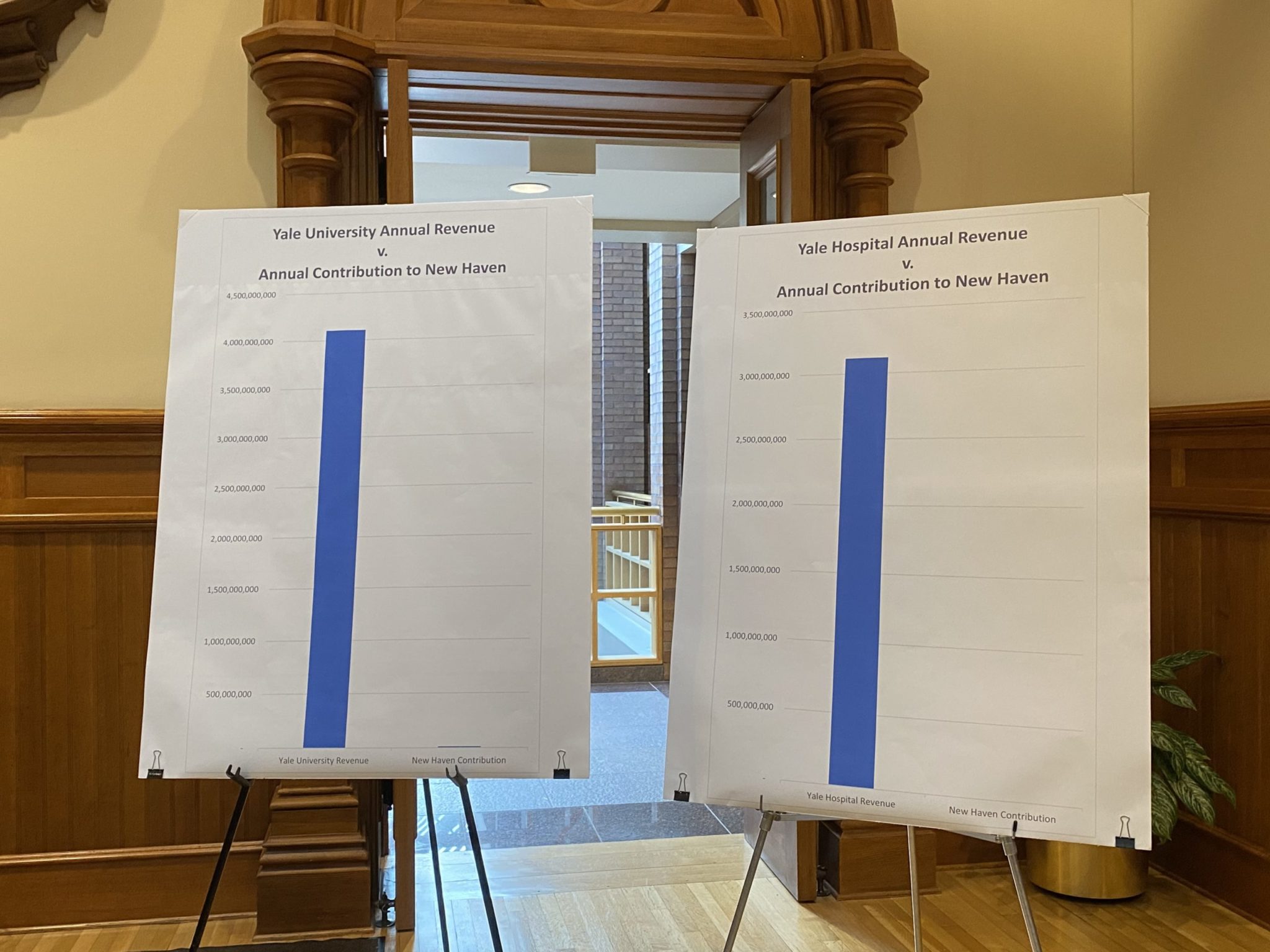
Mackenzie-Hawkins
While outlining proposed changes to the city’s budget at a press conference on Monday, Mayor Justin Elicker called on Yale and Yale New Haven Hospital to increase their financial contributions to New Haven.
At the press conference, Elicker said that the city’s revenue sources in recent years have proven insufficient in light of the city’s goals. Taxpayers have done their part, Elicker said, while the city’s largest local partners — the University and the hospital — fail to meet their ethical responsibilities. In an interview with the News, Elicker said he seeks a $50 million contribution from the University and is still in talks with the hospital about the appropriate figure. University and hospital officials issued statements on Monday that expressed respect for Elicker’s goals but disagreed with how he characterized the institutions.
“I’m calling you to do your part,” Elicker said on Monday, referencing the University and hospital. “This is the town that you are succeeding in. This is the town that you, Yale University and Yale New Haven Hospital, have an ethical responsibility to contribute to — to ensure that our residents have the resources they need, to ensure that we are able to implement the very things that your mission says that you do.”
Property taxes on New Haven residents provide the slight majority of the city’s general fund, and state aid for education and other programming provides the bulk of the remainder. Elicker has routinely called on Connecticut to increase its currently stagnant funding to the Elm City and said on Monday that he plans to work with New Haven’s state delegation to increase resources coming from Hartford. Connecticut, Elicker said, is one of New Haven’s partners. Yale and YNHH are the primary others.
At Monday’s press conference, Elicker displayed two bar graphs juxtaposing the University’s and hospital’s annual revenues with their voluntary contributions to the Elm City. Per Connecticut law, Yale — which owns more than half of the city’s property — is tax-exempt and makes a voluntary payment in lieu of taxes that amounts to $12 million each year.
Yale does pay taxes on its non-academic property, amounting to $5 million annually. This makes Yale one of the top four taxpayers in the Elm City. Yale additionally pays $5 million each year in permitting fees and contributes to public utilities, making its annual contribution around $30 million, according to an op-ed that University President Peter Salovey published in the New Haven Register on Monday.
But that number, even when added to the University’s voluntary contribution, is significantly less than what the University would owe if it were fully taxed — about $146 million. Yale New Haven Hospital’s voluntary contribution is significantly less than the University’s — $2.8 million for the year ending in September 2018.
These figures almost disappeared on the bar graphs next to the institutions’ 2018 revenues: $4.1 billion for the University and $3.1 billion for the hospital.
“There’s not a mistake on these graphs,” Elicker said on Monday. “You literally cannot see on the graph the contribution that the hospital makes because the revenues are so large [and] the [voluntary contribution] amount is so miniscule that the computer won’t even put it on the graph.”
In response, YNHH Senior Vice President Vincent Petrini released a statement expressing his sympathy with Elicker’s position but disagreeing with the mayor’s assertion that the hospital’s voluntary payment should increase. YNHH is the largest taxpayer in the state, he wrote, contributing more than $300 million annually. The hospital additionally pays $6 million in municipal property taxes each year.
Petrini also noted that YNHH contributes to community programs and “remain[s] open to working on creative approaches with the city.”
In his op-ed, Salovey disagreed with Elicker’s calls for larger University contributions, saying that while the University will increase its voluntary payments over time, it will not do so at the rate suggested by Elicker.
“While I applaud [Elicker’s] desire to address the city’s budget deficit head-on, I do not believe that New Haven’s books should be balanced largely by Yale University writing dramatically bigger checks,” Salovey wrote.
According to Salovey, the University’s $12 million payment to the city in the last fiscal year — a 44 percent increase from Yale’s payment three years earlier — was the largest contribution by a university to its host city in the United States. He also noted the economic contributions of Yale’s 14,000 faculty and staff.
Salovey emphasized other methods through which the University contributes to the Elm City, such as funding through the New Haven Promise program, which grants up to $4 million in scholarships to students who attend New Haven public high schools and matriculate to public colleges in Connecticut. Other contribution paths include charitable donations to New Haven nonprofits by Yale community members and departments, alongside volunteer work by students and Yale’s various cultural offerings such as art galleries.
Still, Salovey added that he believes that Yale “can and must contribute in new ways to what I think is the only viable way forward: a concerted effort to stimulate vibrant economic growth in our city.”
“Toward this end, I offer the mayor the full support of this University,” Salovey wrote, “And I would be very eager to explore novel, bold measures that the city, the business community and Yale could take together.”
Elicker received degrees from Yale’s School of Forestry and School of Management in 2010.
Mackenzie Hawkins | mackenzie.hawkins@yale.edu
Valerie Pavilonis | valerie.pavilonis@yale.edu







